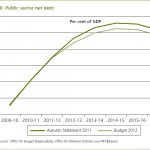
This morning in City A.M., Editor Allister Heath writes once again about the lamentable failure of the political and media class properly to inform the public debate on our country’s finances.
Referring to a poll asking whether the Coalition is cutting the national debt, keeping it the same or increasing it:
These same questions were first asked at the beginning of the year by ComRes, last time on behalf of the Centre for Policy Studies. Depressingly, the public’s economic literacy and understanding of what is actually going on has actually deteriorated. At the time, 10 per cent got the answer right; this time it just six per cent.
If it’s true that just 6% of the public understand that the Government is increasing the debt that they will have to pay later with interest, how is sense to be made of what Metro are reporting today, the rising reliance of the public on food banks? Is IEA Director General Mark Littlewood crying into the void by writing,
About £600bn – around £10,000 for every man, woman and child in the country – will be added to the national debt in Osborne’s fiscal splurge. If this is austerity, it is almost impossible to imagine what largesse would look like.
Thousands of people in our country are struggling with rising living costs, high taxes and disappointing public services. As I see all too often, the welfare state fails those who need it most and yet today we will see, perhaps more clearly than ever before, that we cannot afford what we have.
As I explain often through presentations such as this one, the evidence of the last century is that the Government can take just a little over 40% of GDP in tax. Since about 1970, that’s just what it has done, whoever has been in power. Apart from two brief periods, the British Government has borrowed to meet spending beyond that revenue. And vast amounts of new money were allowed to be created by the banking system, tripling the broad measure of the money supply under New Labour. The consequence is this mess: widespread suffering and hopelessness and profound uncertainty about what has gone wrong.
In the end, the problem is simple: no one, no entity, not even the Government can live beyond its means forever. This is the tomorrow which yesterday bad economists and politicians urged us to ignore. Let’s see if a more useful debate begins today but meanwhile I’m grateful City A.M. at least is prepared to base discussion on the facts.